Like the famous phrase of Emily Dickinson, “the soul should always stand ajar, ready to welcome the ecstatic experience,” university students should be ready to encounter the new at all times. In order to make the best out of their 20s at the University of Seoul (henceforth UOS), more students have been interested in studying abroad sometime during their university lives. Some even say going on a student exchange program is a must-do during their time as university students. As domestic students flying off to foreign universities grow in number every year, the exchange program demands a certain level of institutional stability; however, it currently seems to be lacking in this aspect. Thus, The UOS Times decided to range over various topics regarding the UOS student exchange program, and dig deeper into the fundamental problems of the existing program.
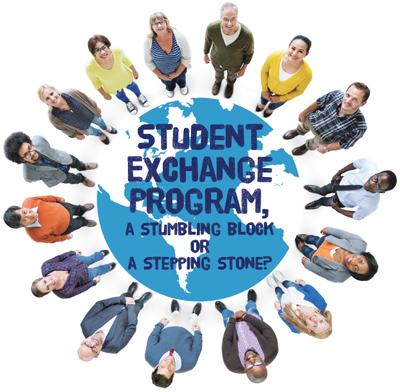
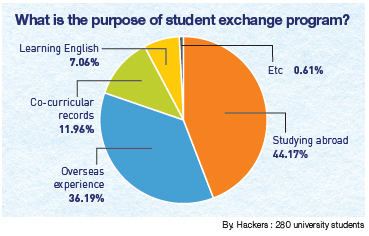
What is IICE?
The UOS student exchange program is organised and directed by Institute of International Cooperation and Education (IICE). IICE is an institute which supports students and nurtures global competence by providing them with various international language education programs. Programs that IICE is in charge of can be divided into two categories: domestic and international. Domestically, IICE provides UOS students with Foreign Language Education Programs, Global Lounge, S Cafe, UOS Tutor, UOS Buddy, and SeoulMate. All of these programs foster students’ linguistic abilities on campus.
In the case of international programs, there are student exchange programs, dual-degree programs, programs which study abroad at one’s own expense, etc. Among these programs, the program we are going to focus on in particular is the student exchange program. Although the student exchange program has various merits, it also has shortcomings which inconvenience students. Not only that, the current program is lacking to accommodate the growing need and interest of students at UOS.

To elaborate a little more on the status quo of the exchange program at our university, there has been a huge increase in the number of UOS students studying at partner universities, compared to that of 2009. From the statistics given by IICE, one can ascertain that ever since 2012, the year in which tuition was halved, the number of applicants has grown by about 30 percent. In just five years, from only 98 students applying in the first semester of 2009 to 263 students in the first semester of 2014, UOS has seen a steep increase in the number of applicants.
Another distinctive feature of the UOS exchange program is that application to English-speaking countries such as USA, Canada or UK is notably low. The UOS Times interviewed Shin Eun-hwa, who is a coordinator in charge of the exchange program to English-speaking countries. She spoke of the preeminently low application rate of UOS students to the US. This is a phenomenon very rare and original to UOS. In the aforementioned survey done by Hackers, about two thirds of 280 university students picked USA to be their ideal destination for an exchange program, with Europe coming in second at 19 percent.
From this result, it was obvious that an overwhelming majority wished to go to USA over European or Asian countries. However, this is clearly not the case with UOS. In the second half of this year, 52 spots at North American universities were available for UOS students. However, with a remarkably low number of students applying, yet only 41 were ultimately chosen to participate in the program at the beginning of next year. The reason behind this unpopularity is unproved; however, we could make some assumptions on the cause of this phenomenon from the interview with the coordinator. She mentioned, “it is a general opinion of the unspecified students at UOS that the acquirement of a TOEFL score, which is relatively a bigger burden for domestic students than getting a decent TOEIC score was at the heart of the problem. Also, being able to easily travel to different countries in Europe seemed to have appealed to the students.”
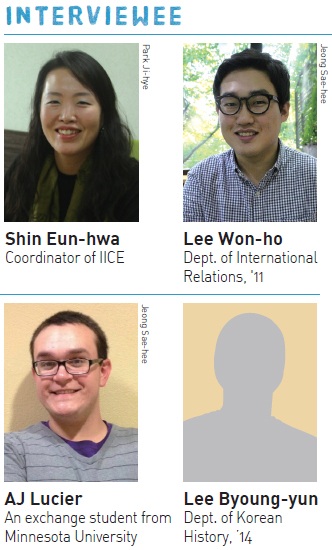
In order to find out what university students tried to gain from the program, we looked at the 2014 survey of the British Council. From the survey, we could note that the strongest appeal of a student exchange program is cultural enrichment, as UOS students also agree. University students can encounter and learn to accept an array of different cultures and perspectives as a student. While on exchange, students are given the chance to thoroughly experience the culture of their host country. By living with people native to the area and studying with the local students, students can be immersed within a different culture much easier than others can. Another advantage, without a doubt, is the acquirement of a new language. Through the exchange program, students will be able to learn much more of the country's tongue than they ever could by studying in a classroom. Even short-term exchanges that are available for one semester will make a huge difference in the student's comprehension of a foreign language, so long as the student is committed to learn. Moreover, in terms of personal development, the exchange program assists students in the best way. The moment students land on foreign borders, they are confronted with challenges. The daily difficulties during one’s time abroad can truly teach students countless life lessons. Having enjoyed the good and been through the bad, students will come back home with inner strength and better self-understanding.
Relation between Half-price Tuition and the program
A benefit UOS students in specific can enjoy is a relatively cheaper cost to study abroad than students from other private universities. UOS is the first university in Korea to benefit from half-price tuition. Ever since the approval of Park Won-soon, current Mayer of Seoul, UOS has seen a dramatic cut in tuition from 2.4 million to 1.2 million won per semester. With such changes, the student exchange program has become more popular among students over the past few years. From last year, there has been a 24 percent increase in the number of UOS students who applied to study abroad for one year at partner universities.
To participate in the program, students do not need to pay extra tuition. All they need to do is to register and pay for the course just like they would for a normal semester in Korea. This means that any registered UOS student is qualified to experience the student exchange program for six months at slightly over 1 million won. If one compares this rate to other private universities, the benefits become a lot more apparent. As can be seen from the chart, when considering the obvious extra expenditures, UOS students enjoy considerably cheap stay at foreign countries. Although UOS students relish halved tuition, 50 percent of students picked financial burden as the biggest setback of the student exchange program, similar to any other university’s student. It is true that living expenses abroad, especially in Europe or North America, give students a hard time. An anonymous student said that she spent almost 10 million won during her sixmonth stay in Spain, with monthly expenditures adding up to more than 1 million a month ? let alone the housing expenses.
The cost of living in another country, sometimes a large figure, makes students hesitant about joining the program in the first place. Many answered that it would be very helpful to lessen this economic burden if IICE or UOS gave out scholarships for participants of the program. However, studying the survey further demonstrates that those who have actually been on a student exchange program found credits to be a bigger problem than economic distress. They believe the real problem lies in the structural weakness of the academic credit approval and GPA conversion system currently in operation at UOS.
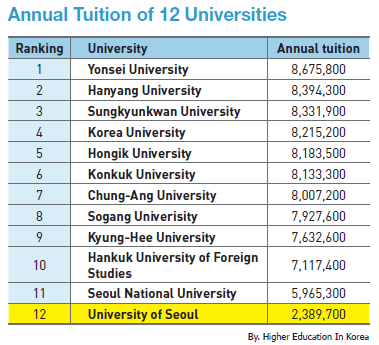
Aside from the economic difficulties students were troubled with, The UOS Times collected the opinions of students on other problems they experienced: credit approval and the newly-adopted GPA conversion system. Upon analysing the survey, we came across many students who doubted the effectiveness of the current system. They complained that students do not normally feel the need to invest a lot of their time studying to get higher scores at partner universities because grades they earned there would not be included in their GPA. The fundamental reason behind the lower commitment to studies is largely due to the point recognition system at UOS. That is, while there are some courses that can be officially credited back home, there are some that cannot. On a similar note, another problem that rose to the surface is the GPA conversion system between partnership schools. Currently, UOS is using its own conversion system for GPAs and credits acquired in a foreign university, which remains controversial.
1) Unqualified to graduate
Unlike other universities like Minnesota University and Sungkyunkwan University where the dean has a final say on whether to approve of the credits earned abroad, UOS is using its own distinctive system to transfer credits. The problem with this is that exchange students inevitably have to take additional semesters to fulfill their graduation credits, which affects not only them but also students in lower grades. Among those surveyed, 46 percent of students said that taking additional semesters to acquire these credits was a huge concern. Although spending extra semesters after the fourth year is a decision up to the individual student, it can still be a concern to students in the lower grades, especially freshmen. Freshmen who are unaccustomed to their majors are faced with a situation where they have to compete with seniors that generally have a better understanding of the course. A student who wanted to remain anonymous mentioned that in major classes, unlike general education classes that are open to all students, seniors have a comparative advantage because the classes are normally an extension of classes in place earlier in the curriculum. Taking the same classes with seniors can give them disadvantage in receiving better grades.
The reason that they could get lower grades is because upper-grade students have learned relatively more about the contents of class and are familiar with presentations or assignments. Lee Byoung-yun (Dept. of Korean History, ’14) believes grading students of different grades together based on the same criterion is unfair, even for general education classes, as it is for major classes. Although he is aware that the introduction of different grading systems for all classes seems unrealistic, he, along with many of his peers, hopes for a different evaluation system between seniors and juniors, especially when it comes to major classes. If the university wants to give students the equality in class, it should treat them differently, taking into account their backgrounds, needs and capabilities.
To ensure the equal treatment among students, the university can open two classes with the same subject: a class for new students attending a lecture for the first time and another for senior students who came back after their exchange program. Unfortunately, it is impossible for all subjects at UOS to be taught in two classes for the division of all classes demands a large sum of money. However, this solution could be adoptable for major classes. This solution may prevent students from giving up their classes because of the suppression and score inequality between students in upper and lower grades. If this is too demanding of the school budget, another solution could be adopting different grading systems that apply separately to students within a class.
Moon Kyung-ja, a professor who has been teaching French introduction classes at UOS for many years has already applied a separate grading system in her class. She finds it very unfair for students encountering the subject for the first time to compete with students who simply know more. At the beginning of every semester, she asks if there is any student who has studied the contents in advance, for instance in foreign language high schools or who is a French language certificate holder. Because it is a mere introduction class to a foreign language, beginners are clearly standing on a different standing line, and she thinks they need to be treated and graded differently to the experienced. If such divided system can be implemented when grading some in UOS, the problem could be minimised.
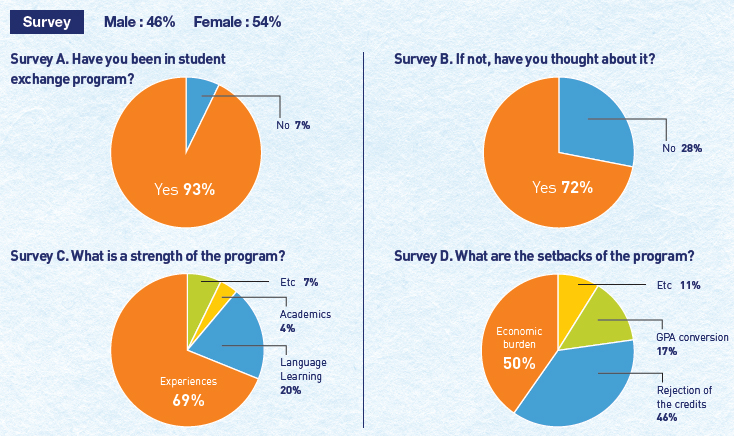
Until 2011, the so-called “Pass or Fail” system was in ef-universities, their grades will not affect the overall GPA and only appear on the report card as pass or fail. This has aroused many complaints and criticisms from students. The main cmplaint was that this system goes against the fundamental intent of the exchange program itself. Clearly stated on the official website of IICE is the purpose of the student exchanges to and from UOS: taking lectures interchangeably to become a global student and embrace new cultures. The current converting system, however, has also failed miserably to encourage students to continue their studies diligently when they go on exchange programs.
As mentioned above, student exchange programs do not only include advantages in academics but also in experience. A life in foreign circumstances allows students to undergo a wide range of experience. They can learn inner or outer values on their trips abroad by being faced with lots of experience and accidents and solving such problems by themselves.
However, the primary purpose of the student exchange programs is to enlarge the range of students’ knowledge. However, the university policy of excluding grades earned during the program from their GPA fails to stimulate students to achieve higher academic success. Not including GPA, students are prone to neglecting studies when abroad. Thus, they tend to disregard their academic achievements to enjoy their pastime. This tendency can leave the professor and authorities of partner universities a bad impression of our students, which is not desirable for future be Incheon National University: its exchange students to University of Granada were noticed of their misconducts and low grades, and this resulted in the principal emailing a warning to all exchange students about their negligence to studies abroad. Including our university, most universities do not include GPAs earned abroad in students’ average GPAs. However, some universities such as Sungkyunkwan University (henceforth SKKU), and Jeon-nam University adopted a different system. They accept exchange students’ GPAs and credits based on the respective university’s own standard.
In case of SKKU, if students have earned their GPA from universities which use different scoring systems from SKKU’s, the department uses other systems such as Pass or Fail, calculating a ratio of the GPA, or crediting the students to their advantage. Jeon-nam University also has its own scoring system, which can be confirmed in beside Criteria. What is common among these universities is that they process their own flex-ible criteria case by case.
Scoring systems that are adopted by the two aforementioned universities are not without problems. The biggest problem is that universities of different continents have their own systems of scoring student’s GPA, and converting grades from different universities into a single streamlined system is very complicated.
Another is that determining the scores of exchange students by the deans of the departments they belong to can have bad effects on some students. For instance, a student who got A- from his host university can get B+ because of the subjective opinion of the dean of the department. This can jeopardise the equality of students to be recognised based on their efforts while studying abroad. However, this is a problem that can be viewed in the short-term. In a more long-term view, GPAs from classes taken abroad should be included in the overall average GPA to increase student motivation during exchange programs and pursue the positive image of the university.
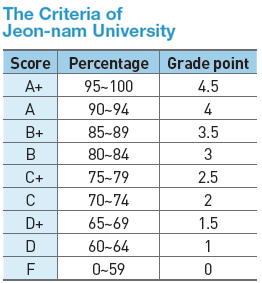
All university students are concerned about economic burdens whether they are interested in the exchange programs or not. Although UOS students are less burdened by economic problems compared to other universities students due to the half-priced tuition, costly living expenses still exist for students who study or want to study in European countries or USA. Regarding this reason, exchange students might not focus on their study completely and have to do part-time jobs to lighten their economic strains. To give a solution to this problem, IICE can benchmark a tutoring program at one of our partner universities. At Minnesota University, every selected exchange student is recommended to participate in the tutoring program. Students are normally paired with two or three students of the host university to teach them their mother language. The participation rate of students is very high because they are given the average of 300 US dollars every month from their schools. A mutual benefit can be expected from both domestic exchange students and host universities.
A similar program to Global Leadership Program (GLP) can be organised to fiancially support students who are participating in the exchange program. GLP was implemented by UOS to fund its students to travel to different countries. Each team of applicants is required to submit a proposal that explains its plans and goals of the trip, and one is finally chosen to travel free of charge. Likewise, scholarships can be given out to exchange students who design a special project of their own at their host universities. For instance, one of our interviewees, Lee Won-ho came up with the idea of BiBiRiYo, the project in which Korean exchange students to Ankara University gathered to promote Korean culture by doing a flashmob and introducing bibimbap to the locals. Just like Lee, exchange students with such bright ideas can be the recievers of scholarships, which can partially lessen the financial pressure on them.
* * *
Though many students know the student exchange program is good for them, they tend not to take it seriously. They just know that the general benefits of the student exchange program are an improvement in one’s linguistic ability and being able to have many new experiences. Compared to other university students, UOS students also benefit specifically from the halved tuition. However, there are also problems with the student exchange program. Many university students are mostly concerned about high living expenses while living abroad. While this is quite true, there can be other important problems for students who are interested in program or have participated in the program; these include complicated academic credit approval and the refusal to convert students’ scores earned from abroad for their GPAs at home. For these problems above, The UOS Times suggested countermeasures to improve the current program by doing a comparative analysis of other universities’ systems. In order to provide our students with better exchange programs, both the school and IICE should take into account the suggestions made above and work hand in hand to fix the institutional problems that exist in the UOS student exchange program.
What is expected from IICE
Currently, IICE provides exchange students-to-be with a list of students and their personal information in order to help them prepare to go abroad alone. Not only that, IICE requires all students that have participated in the exchange student program to write a report about their experiences on the website. Interviewing Lee Won-ho and an anonymous student, and asking sophomore students in the Department of International Relations that have been on a student exchange program, they seemed to be quite pleased with what was given to them. They reckoned information that they got from IICE was quite in detail, and with a little will, students could easily contact the students that have gone to the same host university.
We believe, however, there is still a plenty of room for improvement. We came up with two programs that can better the overall system: a meeting with the staff and another among students. A student-to-staff meeting is geared to help fix the institutional problems that exist at each specific university. There, students can gather to give feedbacks and speak of the difficulties they encountered during their foreign experiences. By doing this, IICE will be able to receive direct feedback and detailed tips as to how the exchange program to certain universities can be revised and improved. Not only that, an interactive meeting between exchange students-to-be and the experienced students would be of greater help to individual students. Students can be grouped based on their host universities or countries to talk about their stay. Through this, students would not only be able to share practical and up-to-date information that they would not have been able to get elsewhere, but also share the good memories and experiences of their time abroad.
Jeong Sae-hee Reporter
saeheejeong@uos.ac.kr
Park Ji-hye Junior Reporter
pinkrabbit94@uos.ac.kr

